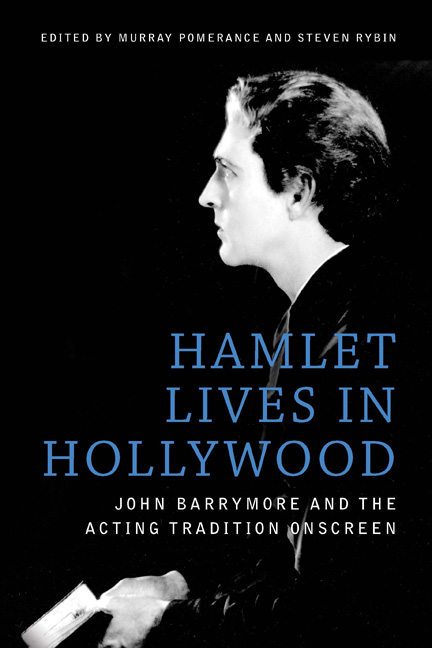Book contents
- Frontmatter
- Contents
- List of Figures
- The Contributors
- Acknowledgments
- Introduction
- 1 The Pre-Bard Stage Career of John Barrymore
- 2 Dangerously Modern: Shakespeare, Voice, and the “New Psychology” in John Barrymore's “Unstable” Characters
- 3 The Curious Case of Sherlock Holmes
- 4 John Barrymore's Introspective Performance in Beau Brummel
- 5 “Keep Back your Pity”: The Wounded Barrymore of The Sea Beast and Moby Dick
- 6 From Rome to Berlin: Barrymore as Romantic Lover
- 7 The Power of Stillness: John Barrymore's Performance in Svengali
- 8 Prospero Unbound: John Barrymore's Theatrical Transformations of Cinema Reality
- 9 A Star is Dead: Barrymore's Anti-Christian Metaperformance
- 10 Handling Time: The Passing of Tradition in A Bill of Divorcement
- 11 John Barrymore's Sparkling Topaze
- 12 “Planes, Motors, Schedules”: Night Flight and the Modernity of John Barrymore
- 13 Barrymore and the Scene of Acting: Gesture, Speech, and the Repression of Cinematic Performance
- 14 “I Never Thought I Should Sink So Low as to Become an Actor”: John Barrymore in Twentieth Century
- 15 Barrymore Does Barrymore: The Performing Self Triumphant in The Great Profile
- Works Cited
- Index
8 - Prospero Unbound: John Barrymore's Theatrical Transformations of Cinema Reality
Published online by Cambridge University Press: 23 June 2018
- Frontmatter
- Contents
- List of Figures
- The Contributors
- Acknowledgments
- Introduction
- 1 The Pre-Bard Stage Career of John Barrymore
- 2 Dangerously Modern: Shakespeare, Voice, and the “New Psychology” in John Barrymore's “Unstable” Characters
- 3 The Curious Case of Sherlock Holmes
- 4 John Barrymore's Introspective Performance in Beau Brummel
- 5 “Keep Back your Pity”: The Wounded Barrymore of The Sea Beast and Moby Dick
- 6 From Rome to Berlin: Barrymore as Romantic Lover
- 7 The Power of Stillness: John Barrymore's Performance in Svengali
- 8 Prospero Unbound: John Barrymore's Theatrical Transformations of Cinema Reality
- 9 A Star is Dead: Barrymore's Anti-Christian Metaperformance
- 10 Handling Time: The Passing of Tradition in A Bill of Divorcement
- 11 John Barrymore's Sparkling Topaze
- 12 “Planes, Motors, Schedules”: Night Flight and the Modernity of John Barrymore
- 13 Barrymore and the Scene of Acting: Gesture, Speech, and the Repression of Cinematic Performance
- 14 “I Never Thought I Should Sink So Low as to Become an Actor”: John Barrymore in Twentieth Century
- 15 Barrymore Does Barrymore: The Performing Self Triumphant in The Great Profile
- Works Cited
- Index
Summary
John Barrymore is the supreme embodiment of theater on film. No matter what roles he plays, the aura of theater inescapably and (so often) magically defines his relation to the camera and to his fellow performers. Theater for him offers the potential to burst the boundaries of an assigned role at any moment, to annul the threat of confinement to a tediously fixed disposition. Barrymore seems always a visitor to the land of film from another country. He carries the burden of exile though in an antic fashion. We feel his true home and deepest commitments lie elsewhere. Like his character the Baron in Edmund Goulding's Grand Hotel (1932), he is drawn to shadow spaces on the periphery of the main action. He emerges for brief intervals as a half-spirit, half-charlatan, seeking a kind of connection and fulfillment that are unattainable. One feels he prefers the elusive or impossible goal, and secretly craves to have his aims thwarted.
His roles frequently seem designed to test the distinctions between film's sense of the real and theater's. He is a creature of this borderland, and many of his most famous characterizations highlight division and the necessity of repeated transformation. Film offers the possibility of direct human revelation. The camera desires to discover who the man Barrymore is without the protections of disguise. Barrymore resists exposure of the self behind the theater personage yet so many of his characterizations are precisely about masks gradually torn away and a subjection to merciless social scrutiny. Perhaps the role in which Barrymore is most caught up in theatrical flummery and, at the same time, most painfully probed by the camera is Larry Renault in George Cukor's Dinner at Eight (1933), a figure who is lethally entrapped on the illusion-shredding stage of his hotel room. Interestingly, Barrymore's conception of this ham actor stresses that his destruction results in large part from insufficient belief in theatrical transformation and in theatrical means for approaching truth. Renault cannot hide behind a mask and, as a result, he is prey to almost everyone. The elements of Renault's failure to believe in theatrical metamorphosis, until the role of a literal dead man presents itself to him as a way out of his difficulties, will be my primary focus in this chapter.
- Type
- Chapter
- Information
- Hamlet Lives in HollywoodJohn Barrymore and the Acting Tradition Onscreen, pp. 98 - 108Publisher: Edinburgh University PressPrint publication year: 2017



